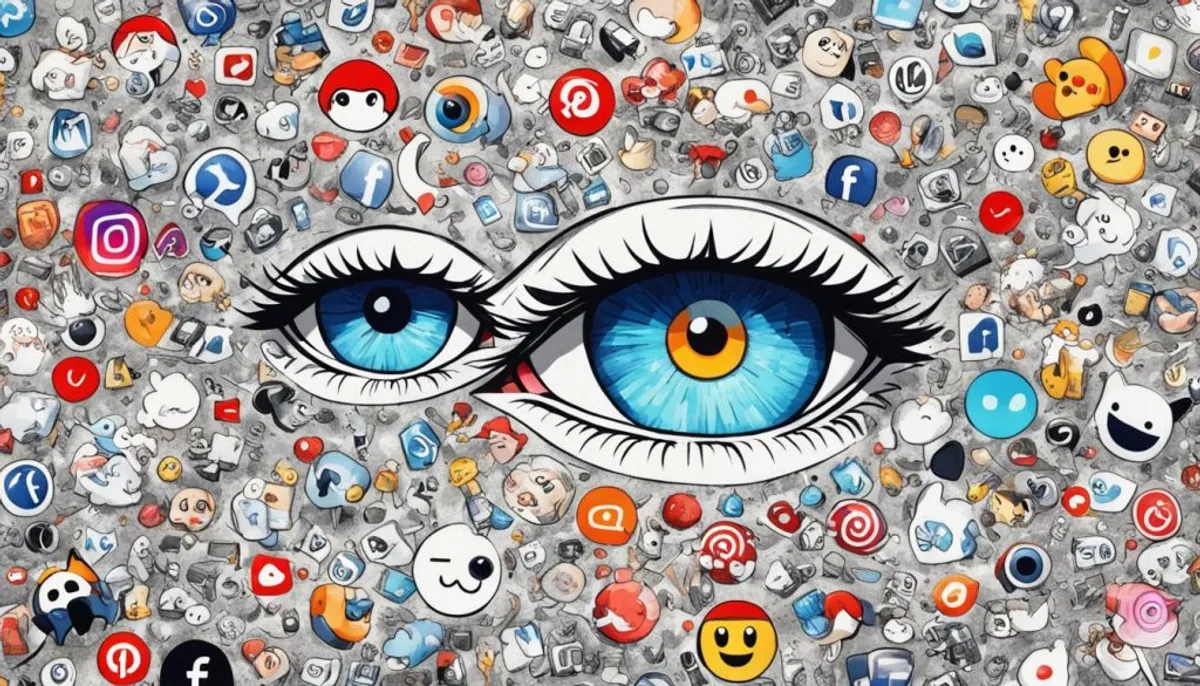Social media is now a big part of our lives. It changes how we see things and what we do daily. However, what you see on social media isn’t always the full story. This piece will dig into what social media truly isn’t. It’ll shake off the wrong ideas we’ve come to believe.
Social media can be tricky. It mixes up what’s real with what looks good. For many, it’s a way to make real friends and show who they are really. But, it’s really turned into something else. It’s now a place where we can’t stop looking at our screens. We’re always showing the best parts of our lives, hoping to get noticed more than the next person.
Key Takeaways
- Social media is not a true reflection of reality, but rather a carefully curated illusion.
- The constant pursuit of likes, shares, and validation on social media can lead to an unhealthy obsession and a distorted sense of self-worth.
- Social media can create an echo chamber, reinforcing our existing biases and limiting our exposure to diverse perspectives.
- The “vanity fair” nature of social media encourages us to present a false, idealized version of ourselves, leading to feelings of inadequacy and a lack of authenticity.
- The attention-grabbing design of social media platforms can trap us in a cycle of endless scrolling, distracting us from meaningful experiences and personal connections.
- The privacy concerns associated with social media, including the collection and exploitation of our personal data, pose a significant threat to our digital well-being.
- Recognizing the true nature of social media is the first step towards regaining control over our online experiences and cultivating a healthier relationship with technology.
The Facade of Perfection on Social Media
Social media is a big deal in our world today. It lets us share and connect with others. But, it also shows a fake kind of perfect life. People post photos and stories that make everything seem flawless. This makes us feel like our own lives are not good enough. Additionally, we must consider the risks of social media for youth, as these platforms can significantly impact their self-esteem and mental health.
Mirage of Perfection
When we go through social media, we see only the best parts of people’s lives. We see perfect holidays, amazing houses, and super stylish folks. But, this perfect image is not real. It makes us think we need to be perfect too. This can make us feel like we’re not as good as others.
Reality Behind the Filter
But, there’s a hidden truth. Creating these perfect social media posts takes a lot of time and energy. People might give up their true selves to look perfect online. Sadly, this can hurt their mental health.
Cost of a Million Likes
Trying to get lots of likes can change how we see ourselves. We start to think our value is based on how popular our posts are. This can make us forget what’s really important in life. Real relationships and experiences get less attention.

what social media is not
Real VS. Virtual
Social media mixes up what’s real and what’s not. It shows a perfect life that’s not always true. This makes people feel connected in a way that’s not really them.
Embrace Your Reality
It’s better to love your own life, even if it’s not perfect. This can make you feel happy and ok about yourself. Loving your life means liking the real parts and not the fake.
Gratitude, Not Comparison
Seeing others’ perfect lives can make us sad about our own. But, we should be thankful for our life. Being grateful helps us not get stuck in the fake world of wanting what others have.
FAQ
What is the “Mirage of Perfection” on social media?
It’s the image of being perfect on social media. People make their lives seem perfect. This makes others feel bad when comparing their own lives.
What is the “Reality Behind the Filter” on social media?
The “Reality Behind the Filter” shows the hard work and struggles behind perfect pictures. It contrasts reality with the perfect images we see.
What is the “Cost of a Million Likes” on social media?
The “Cost of a Million Likes” shows how wanting likes can hurt real life. It can make us not value true experiences and real connections.
It leads to too much focus on social media.
How does social media create a “Real VS. Virtual” dynamic?
Social media mixes real life with a virtual world. It can make us feel like we’re close to others. But often, what we see isn’t the full truth.
What does it mean to “Embrace Your Reality” on social media?
It’s about finding happiness in your own story. Instead of wanting what others seem to have, focus on your own journey. Be true to who you are.
Why is it important to focus on “Gratitude, Not Comparison” on social media?
Choosing to be thankful stops us from comparing on social media. It helps us enjoy our own life without jealousy, which is essential for maintaining emotional health after breakups.
It can lead to being more happy with where we are.
RelatedRelated articles



